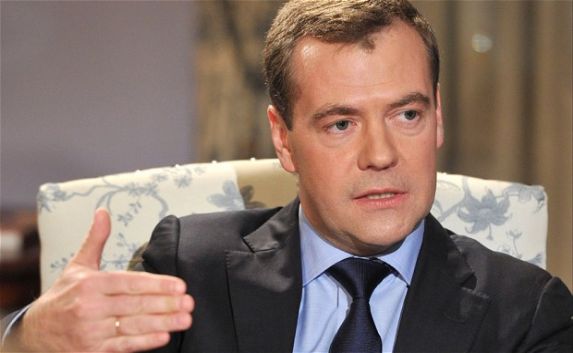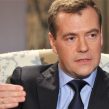
US-Russian Relations Wither as the Kremlin Seeks out Internal and External Enemies
Publication: Eurasia Daily Monitor Volume: 10 Issue: 18
By:

Since the rebellion against the regime of Syrian President Bashar al-Assad began almost two years ago, many in the West and in the Arab World have eagerly awaited evidence of Moscow beginning to finally ditch the brutal and seemingly doomed Syrian regime. In an interview aired by CNN on January 28, Prime Minister (and former Russian president) Dmitry Medvedev was quoted as saying that “chances for him [al-Assad] surviving are slipping away,” which was interpreted as Moscow distancing itself from its longtime Middle East client. Medvedev criticized both al-Assad and the Syrian opposition for not talking to each other and insisted that outside powers must not intervene in the crisis (https://government.ru/eng/docs/22547/; RIA Novosti, January 29).
Medvedev is known for making nice, liberal-sounding, vague statements, which are well received in the West and in liberal auditoriums in Moscow. This month, at a Moscow conference commemorating the pro-market liberal reforms of the late Prime Minister (in the 1990s) Yegor Gaydar, Medvedev once again broached the topics of political and economic modernization in Russia, and about “expanding political and economic freedoms.” However, the present regime of President Vladimir Putin is instead ruthlessly cracking down on political dissent, suppressing civil society and expanding government control of the economy. In foreign policy, specifically on Syria, Medvedev does not have a decisive say—either informally or under the Russian constitution. Moreover, informed sources in Moscow’s corridors of power insist a campaign has begun to discredit Medvedev and force his ouster (Nezavisimaya Gazeta, January 18).
Medvedev is increasingly a pathetic figure: He publicly vows unequivocal personal loyalty to Putin and rules out running against him in 2018, if Putin decides to be re-elected for another six-year term. Medvedev has publicly insisted the death in custody of anti-corruption lawyer Sergei Magnitsky “does not interest anyone, except perhaps certain individuals who are earning political capital from it” and that Magnitsky was “not a truth-seeker.” Medvedev obviously hopes someday Putin will reward him for his loyalty by once again granting him the presidency, maybe in 2024. Putin has time and again overtly shown his contempt and displeasure by publicly criticizing Medvedev’s government. Whereas, other powerful figures want to remove Medvedev from the corridors of power as soon as possible (Nezavisimaya Gazeta, January 24).
A film was posted recently on YouTube accusing Medvedev of being a traitor, who is either an agent working for the United States, or an idiot, unwillingly promoting a US-led conspiracy against Russia (https://www.youtube.com/watch?v=zrtcVd1LASc&feature=youtu.be). The film is not some kitchen-made amateur show: It lasts some 80 minutes and consists of professional footage and animation, including exclusive interviews with former Prime Minister Yevgeny Primakov, known to be close to the Kremlin, as well as with top Russian diplomats connected to Libya and the Middle East. The film was apparently made by Russian state TV, but was not aired and was eventually posted on the Internet. The film and interviews describe Medvedev’s alleged betrayal of Libya’s Muammar Gaddafi—Russia’s longtime friend and ally. The film asserts that in March 2011, Medvedev insisted, against the opinion of the Russian foreign ministry, not to veto United Nations Security Council Resolution 1973, which authorized the imposition of a no-fly zone over Libya, leading to a NATO-headed military action that eventually toppled Gaddafi. It is alleged that in Libya Russian state-connected companies have lost billions of dollars in contracts with the late Gaddafi regime because of Medvedev. In the film, Primakov insists that today, under Putin, Russian policies have drastically improved and on Syria Moscow is holding firm, resisting Western attempts to destroy al-Assad the same way as Gaddafi. The film contends that after destroying Gaddafi and al-Assad, the US may turn against Putin and conjure a similar regime-changing campaign of foreign-induced internal strife and possible direct military intervention.
Medvedev’s comments on Western cable news notwithstanding, Moscow’s position on Syria is not shifting. The Russian navy has deployed a task force off the Syrian cost of several warships, submarines and landing craft with marines. This week, Defense Minister Sergei Shoigu and his first deputy, Chief of the General Staff, General Valery Gerasimov, were shown on officially released footage reporting to Putin in the Kremlin about large-scale naval exercises supported by the deployment of long-range strategic bombers in the Mediterranean and Black Seas. At the same time Shoigu and Gerasimov presented Putin a draft “plan to defend Russia” that “includes all threats coming from events around Russia and its rearmament plans.” No details of the new Defense Plan were released, but Putin insisted that the General Staff has for the first time written such a Defense Plan and directly connected it to naval exercises near Syria (www.kremlin.ru, January 29).
US-Russian relations have been drastically worsening recently as Putin seems seriously concerned Washington is promoting a pro-democracy protest movement in Moscow to oust him from power. From the US side of the Atlantic such a notion would seem extremely farfetched, especially associated with President Barack Obama’s administration. But speaking recently at a meeting in the Military Science Academy in Moscow, Gerasimov announced the Russian military is “ready for a large-scale war,” apparently implying that Russia may soon be under attack (https://news.day.az/politics/380324.html).
Different cooperation programs between Russia and the US have been recently closed down. USAID was expelled from Russia, while other US charitable foundations have been curtailing their work and fleeing. Reportedly, the National Democratic Institute (NDI) and International Republic Institute (IRI) have not only closed their Moscow offices, but have evacuated their Russian employees together with families from Russia to Lithuania, afraid they may be prosecuted as foreign spies (Kommersant, January 30). The US-Russian confrontation has even overlapped into trade, with Russian authorities announcing a total ban on the import of US beef and pork as an alleged health hazard beginning February 11 (Interfax, January 31).
During his first term, Obama has mostly invested in building relations with Medvedev as a young and potentially progressive leader—a policy that seems to have backfired badly as Medvedev has faded from prominence. Putin is angry at what he sees as Washington’s meddling by adopting the Magnitsky Act. Others in the Russian ruling elite also believe rabid anti-Americanism and the promotion of an alleged US military threat may bring them more power and budget money to misappropriate. The Obama administration will most likely try to contain this drastic deterioration in relations, but it will not be easy and Moscow will surely require major concessions in return for any degree of future cooperation.




